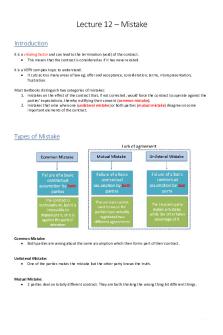Contract Law 2018 Tutorial 9 Mistake PDF

| Title | Contract Law 2018 Tutorial 9 Mistake |
|---|---|
| Course | Elements of Contract Law |
| Institution | Queen Mary University of London |
| Pages | 4 |
| File Size | 57.6 KB |
| File Type | |
| Total Downloads | 84 |
| Total Views | 182 |
Summary
1. When will courts recognise a mistake as 'operative'? There are several problem questions in the mistake tutorial, including one on the Bell case....
Description
1. When will courts recognise a mistake as 'operative'? Definition of operative mistake. A mistake in a contract that is so serious that it means that the contract has no legal effect. [ The law of mistake refers to where both parties have entered a contract under the same fundamental mistake, which will render the contract void.
Mistake is a remedy which can arise either through the common law or equity, however, the decision in Great Peace Shipping Ltd v Tsavliris Salvage International) Ltd [2003] QB 679 has limited mistake mostly to the common law. There are three broad categories of mistake which this chapter will explore: Non-Agreement mistake Mutual agreement mistake Unilateral mistake 2. How, if at all, is Bell v Lever Bros. reconciled with Solle v Butcher? Do you find the judgment in Great Peace Shipping Ltd v Tsavliris Salvage (International) Ltd. advances or impedes the doctrine of mistake?
. Bell v. Lever Brothers Ltd. [1932] A.C. 161 recognises that a common mistake which totally undermines a contract renders it void. Solle v. Butcher [1950] 1 K.B. 671 recognises a doctrine of 'mistake in equity' under which a serious common mistake in contract formation falling short of totally undermining the contract could give an adversely affected party the right to rescind the contract. t the enormous difficulty in differentiating these two kinds of mistake justifies the insistence by the Court of Appeal in The Great Peace [2003] Q.B. 679 that there can be only one doctrine of common mistake.
It was held where there was a common or mutual mistake it would raise difficult and important issues of construction and where it was possible to perform the contract but it was alleged that a mistake in relation to a fundamental assumption, which rendered performance of the obligation impossible (or on these facts impracticable) it will be necessary to determine this.
The lesson from this case is that unless the common or mutual mistake renders the essence of the contract fundamentally different from what the parties anticipated, which will be unlikely, they will be required to complete their obligations impossible or not.
3. A and B are art collectors. A has a picture that may be a Rembrandt. A offers to sell it to B. Discuss the following problems. (i) A says to B: "It's a Rembrandt all right", whereupon B buys the picture. It is not a Rembrandt. (ii) A and B mistakenly believe it is a Rembrandt and B purchases it for £500,000. Mutual agreement mistake An agreement mistake is one in which a fundamental mistake has been made relating to the terms of the contract which prevent the formation of a legally binding contract. This is often referred to as an ‘offer and acceptance’ mistake. The parties will subjectively believe they have formed a legally binding contract, but in reality have not done so. This first examination of agreement mistake will concentrate on mutual agreement mistake, where both of the parties to the contract hold this belief. An example of a mutual mistake can be found in Raffles v Wichelhaus(1864) 2 Hurl & C 906, where a contract was made for the purchase of some cotton which would be delivered by a ship named ‘Peerless’ which (iii) A thinks it is a "school of Rembrandt" picture, but B thinks it is an original. (iv) Same as (iii) but A knows B thinks it is an original. (v) B thinks A is warranting the picture to be original, but A is not. Lord Denning in Lewis v Averay [1972] 1 QB 198 suggested in the event of mistake as to identity, the contract should be void, not voidable. This would protect the third party, as Lord Denning suggested they are generally the most innocent party and the one in need of protection. This (vi) B thinks A is warranting the picture as original. A knows this, and has no intention of warranting it. 4. Lorenzo is a celebrated clothes designer. He decides to place crushed velvet trousers at the centre of his line of clothing for men. He visits Millicent’s fabric shop. Millicent shows him several samples of crushed velvet from which Lorenzo selects a heavy velvet fabric known as ‘Lux-o-velvet’. He orders 10,000 metres of fabric at a cost of £50,000. When he does this, he tells Millicent that 500 metres of the fabric are for his brother, Norbert, who intends to make men’s cravats for them. This will be the first time that Norbert has produced clothing. Unilateral mistake as to the terms of the contract The three requirements that will render a contract void for unilateral mistake in relation to the terms of a contract are: One party is mistaken as to a term of the contract, and would not have entered the contract but for this mistake The mistake is known or reasonably ought to be known to the other party The mistaken party is not at fault Requirement one is fairly straightforward, the courts will consider whether, if the mistaken
party had known the real truth as to their mistake, they still would have entered into the contract. If they would have, this cannot amount to an actionable claim for mistake. 5. Andy finds a credit card with the name ‘Bob Baker’ on it. Foolishly, Bob Baker has written his pin number on the back of the card. Andy decides to stay at an expensive hotel, Crummy Towers. He checks into the hotel by using its automated check-in machine. To check in, he is required to insert his credit card in the machine and enter the pin number. As he is doing this, he is simultaneously monitored on a close circuit television camera placed at the top of the machine. Andy checks in as ‘Bob Baker’ and uses Baker’s credit card and pin number. After the Crummy operator has looked at Andy on the television screen and checked the details of Bob Baker in a database, he is allowed to enter the hotel. Crummy offers special shopping services to all of its guests. Guests are able to select items from a range of expensive boutiques; Crummy purchases these goods on their behalf and then sells them on to their guests for the price of the item and a 5% shopping fee. Crummy adds the charges to their room bill. Shortly after Andy has checked in, he orders and receives jewellery worth £10,000. Andy also purchases two suits for £1,000 in the Dapperman shop across the street from Crummy Towers. He presents Bob Baker’s credit card to pay for the purchase. Finally, on his return to the hotel, he orders DVDs worth £200 by telephone from the Electrobyte shop. Electrobyte deliver these goods later in the evening. After several days at the Crummy Towers, Andy disappears taking with him the jewellery, suits and DVDs. He sells all of these items to Fred.
To understand the significance of a claim for mistake as to identity, the result of a claim under fraudulent misrepresentation in this example should be examined. As you will know, the two remedies for misrepresentation are damages and rescission. In the case of damages, as Party B has disappeared, Party A will have nobody to direct the claim for damages to, and will have no chance of recovering anything. As for rescission, as Party B passed property to the goods to Party C, who were unaware of the misrepresentation, there will be a bar to rescission in the form of third party rights. As you can see, fraudulent misrepresentation is not an ideal claim to bring where the statement maker cannot be traced. A claim for unilateral mistake as to identity provides a remedy in this situation. Due to the mistake, the contract is void at the time of creation, therefore, Party B would never have title in the goods, and therefore could never pass title to Party C. This means that Party A has one of two remedies; they may recover the goods from Party C, or sue Party C under the tort of conversion. Unfortunately, there is a clear issue here, Party A and Party C are both innocent, yet one will be subject to an unequitable result. Lord Denning in Lewis v Averay [1972] 1 QB 198 suggested in the event of mistake as to identity, the contract should be void, not voidable. This would protect the third party, as Lord Denning suggested they are generally the most innocent party and the one in need of protection. This approach was rejected by the other judges and instead the courts outlined circumstances in which a mistake to identity would be actionable.
Lewis v Averay – What is a mistake as to identity? The decision in Lewis v Averay made a distinction between ‘true mistakes as to identity’ and mistakes as to attributes. Mistake as to the attributes of a party is not sufficient for an actionable claim of mistake, for example, the creditworthiness of a party. The mistake must be as to the actual identity of the party. An example of this can be found in King’s Norton Metal Co v Edridge Merrett & Co (1897) 14 TLR 98, where a fraudulent party pretended to be a business, but in reality the business they claimed to be did not exist. The contract was for the sale of goods, and the fraudulent party disappeared once he had received the goods. The aggrieved party claimed that the contract was void for mistake as to identity....
Similar Free PDFs

Contract Law - Tutorial 9
- 8 Pages

Mistake - Summary Contract Law
- 6 Pages

Contract Law Tutorial 2
- 6 Pages

Contract Law Tutorial 8
- 3 Pages

Mistake Tutorial
- 4 Pages

MISTAKE OF LAW VS MISTAKE OF FACT
- 14 Pages

Contract Tutorial
- 4 Pages

mistake crim law
- 3 Pages
Popular Institutions
- Tinajero National High School - Annex
- Politeknik Caltex Riau
- Yokohama City University
- SGT University
- University of Al-Qadisiyah
- Divine Word College of Vigan
- Techniek College Rotterdam
- Universidade de Santiago
- Universiti Teknologi MARA Cawangan Johor Kampus Pasir Gudang
- Poltekkes Kemenkes Yogyakarta
- Baguio City National High School
- Colegio san marcos
- preparatoria uno
- Centro de Bachillerato Tecnológico Industrial y de Servicios No. 107
- Dalian Maritime University
- Quang Trung Secondary School
- Colegio Tecnológico en Informática
- Corporación Regional de Educación Superior
- Grupo CEDVA
- Dar Al Uloom University
- Centro de Estudios Preuniversitarios de la Universidad Nacional de Ingeniería
- 上智大学
- Aakash International School, Nuna Majara
- San Felipe Neri Catholic School
- Kang Chiao International School - New Taipei City
- Misamis Occidental National High School
- Institución Educativa Escuela Normal Juan Ladrilleros
- Kolehiyo ng Pantukan
- Batanes State College
- Instituto Continental
- Sekolah Menengah Kejuruan Kesehatan Kaltara (Tarakan)
- Colegio de La Inmaculada Concepcion - Cebu







